Communities along Mariner East 2 pipeline route brace for construction
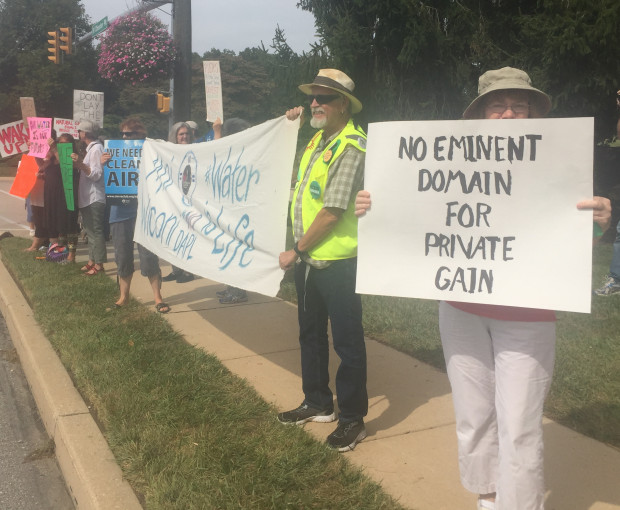
Susan Phillips / StateImpact PA
Protesters outside of Sunoco headquarters in Newtown Square. Landowners along the route and anti-pipeline activists are preparing lawsuits to challenge any permits issued by DEP.
Sunoco Logistics officials declined to say whether they are expecting Pennsylvania’s Department of Environmental Protection to issue on Friday the final two state permits that the company needs to begin construction of the company’s controversial Mariner East 2 pipeline. A spokesman for DEP also said “there is no timetable for a decision.”
But according to rumors recently circulating among nonprofits, community groups, anti-pipeline campaigners – all citing unnamed sources in the DEP — the department will issue the long-awaited water-crossing and earth disturbance permits on Friday.
Some opponents of the 350-mile natural gas liquids line have predicted that DEP would issue the permits by the end of January following pressure from the administration of Gov. Tom Wolf to meet Sunoco’s stated schedule of beginning construction by “late winter or early spring” of this year and starting operation in the third quarter.
Asked about issues and delays regarding permit approvals for the $2.5 billion line, Wolf told a group of Philadelphia area business people in mid-January that the line could be approved. “We’re working through that,” he said. A spokesman for Governor Wolf has told StateImpact that the decision over Mariner East 2 pipeline permits rests solely with the Department of Environmental Protection.
Approval of the permits would bring Sunoco to the end, or close to it, of a long permitting process in which DEP has found many deficiencies in the company’s application, forcing it to resubmit documents, re-do applications, and delaying the start of construction.
Residents along the pipeline’s path, along with anti-pipeline activists, worry that DEP will issue the permits regardless of whether agency staffers at the regional offices have completed their reviews, and whether or not Sunoco has met all requirements. Requests to DEP’s central office about agency policy on issuing permits while deficiencies still exist went unanswered.
Sunoco spokesman Jeff Shields said on Tuesday that the company does not know if or when the permits will be issued.
“I have to defer to the DEP on that,” Shields said after a news conference to announce the addition of 20 jobs at the Marcus Hook Industrial Complex, where the cross-state pipeline would have its eastern end. “We don’t control that. We don’t know. We just try to supply them with whatever information they require.”
Shields said he was unaware of any information that the DEP still needs to make a decision on the permits but said that could change. “It can be a fluid process so there could be something that comes up,” he said. “There always can be more questions.”
Shields said the deficiencies in previous stages of the application did not indicate that the application itself was deficient, just that the DEP needed more information.
But communication between Sunoco officials, their contractors and DEP staffers, obtained by StateImpact through a Right-to-Know request, show extensive documentation of repeated deficiencies, requests for information, and detailed explanations regarding the incompleteness of the permit applications dating back several years.
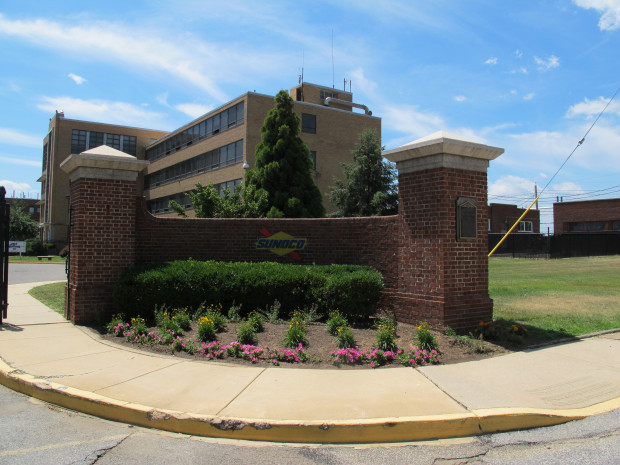
Susan Phillips / StateImpact PA
The entrance to Sunoco's refinery in Marcus Hook, Delaware County. The company says it doesn't know when the permits will be issued and that they're waiting to hear from DEP on their re-submitted applications.
A lengthy permit process and a growing list of deficiencies
On May 23, 2014, DEP held a “kick off meeting” with Sunoco officials and their contractor Tetra Tech at the Hilton Hotel in Harrisburg to initiate discussions about the pipeline “to obtain agreement on proposed direction regarding investigation, reporting, and compliance with regulations to obtain the required permits for the installation of this pipeline,” according to an agenda obtained through the Right-to-Know request.
Dozens of face-to-face and phone meetings occurred throughout the next year, including meetings, emails and calls between DEP’s regional offices and Sunoco Logistics’ employees Matt Gordon and Monica Styles. On October 1, 2015, DEP sent Sunoco an “incompleteness review,” which included 15 separate items to be addressed. And yet, communication between the parties continued to reveal Sunoco’s lack of action when it came to deficiencies. And the number of documented deficiencies kept growing.
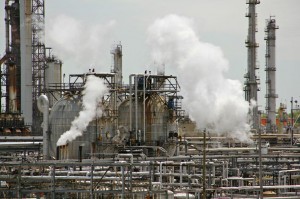
Newsworks
Sunoco Logistic's plant in Marcus Hook, Delaware County. The site is undergoing construction to convert it from an oil refinery to a natural gas storage and processing plant.
For example, a memo dated January 28, 2016 sent to Sunoco’s Gordon and Styles from DEP’s South-central office detailed how Sunoco’s application remained incomplete. The memo, written by Nathan Crawford, permits section chief for DEP south-central region’s waterways and wetlands program, and Ed Muzic, dam safety, waterways and wetlands section chief, provides step-by-step instructions for Sunoco on how to comply with the permit applications, referencing Pennsylvania codes and describing in great detail how to correct what continued to be deficient.
Examples of those deficiencies included no post-construction stormwater management plans for above ground facilities like pump stations, requests for riparian buffer waivers where the location of the riparian habitat was not identified, and unidentified exceptional value wetlands.
Similarly, a memo dated January 29, 2016 to Sunoco’s Gordon and Styles from DEP’s Southeast regional office listed three remaining issues with the Chapter 102 permits from the October 1, 2015 letter, along with sixteen new items to be addressed based on Sunoco’s response.
About three months later, in a conference call on May 3, 2016 with about a dozen representatives from Sunoco and their contractor Tetra Tech, along with Sunoco’s attorneys, DEP staffers discussed deficiencies that they said had not yet been adequately addressed. At the meeting, Sunoco promised detailed responses to DEP’s comments, including revised drawings of non-delineated wetlands, pump stations, and streams by May 23.
The public weighs in heavily
The agency published the permit applications June 24, 2016 in the Pennsylvania Bulletin, which generated an unprecedented 29,000 public comments, some of which revealed even more deficiencies to DEP.
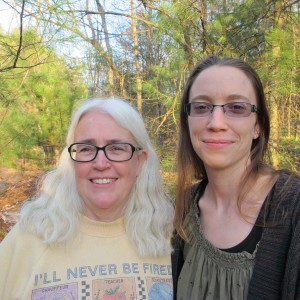
Susan Phillips / StateImpact Pennsylvania
Ellen Gerhart (L) with her daughter Elise on their land in Huntingdon County. Ellen Gerhart is one of 29,000 people who submitted comments to the DEP regarding permits for Mariner East 2. The family has been battling Sunoco in the courts over eminent domain.
Four months later, on September 6, DEP issued response documents, known as “deficiency letters,” detailing missing or insufficient information, and outlining an incredibly long list of problems with the company’s proposals including: a lack of construction details for water crossings, no analyses for how water quality standards for each crossing will be maintained or how the area will be restored after construction, no mention of nearby drinking water wells and contact information for those responsible for them, no project wide cumulative impacts analysis, no secondary impact analysis, no explanation of how threatened or endangered species will be protected, no evidence of consultation with or approval from the Pennsylvania Historical and Museum Commission for protecting cultural heritage sites, and no emergency plans in the case of a pipeline rupture.
Two months later, in an email from DEP’s director of the office of program integration Ann Roda, dated November 10, 2016 to Sunoco’s Monica Styles and Tetra Tech’s Brad Schaeffer, Roda discusses wetland mitigation, public comments and the “December application review.”
Roda informs Sunoco that wetland impacts need to be mitigated:
“The resubmission should include a more final plan that includes specific details on where and how the mitigation will be conducted. Before rendering a decision on the permits the Department will also need to see confirmation that the landowner is in agreement and how the area will be protected from cutting etc. The necessary instruments needed for the mitigation can be executed assuming a permit is issued.”
Roda also supplied Sunoco with a list of public comments DEP wants the company to address. Many of the comments include detailed deficiencies, concerns about pipeline safety, frustration with the ongoing eminent domain process, and pleas for help from DEP. Here’s a few examples:
“… I have a building where they want to put it and a sewage system that is 100% in the path, no one has been in contact!!! tired of there constant harassment. name and address on attachments 3rd photo is of them pumping drilling fluid into stream, I had called DEP ,they came and said that it was OK.”
“Please accept this email as my comments against the approval of the Mariner II pipeline. Sunoco/the pipeline builders caused over $80,000 worth of damage to my property in Union Township Washington County when they drilled under Mingo Church Road. I had extensive flooding and drill mud all over my property…. I am currently in communication with my attorney to determine my next step to ensure that my property is not permanently damaged with any subsequent pipeline construction.” (5962)
“My name is Joan Leach. My husband and I own a 23 acre farm in Cumberland County where we raise a small herd of cattle. I would like to comment on Sunoco’s Pennsylvania Pipeline Project and its impact on water crossings. We are well aware of the requirement to keep our animals from streams and wetlands and to manage our manure to prevent contaminating the Chesapeake Bay and the environment. All construction sites must protect from erosion and runoff. If Sunoco is permitted to trench its way through most of Pennsylvania’s water obstacles, where is the DEP’s concern for the Chesapeake Bay and the environment? How much mud and silt will be sent downstream? The private citizen must abide by the law. Will Sunoco, a major corporation, be given a pass?”
The battle could move to the courts
Sunoco asked for and received more time to respond to the September deficiency letters and on December 5 the company submitted their responses to DEP, which are posted online.
Landowners and activists along the route say they are preparing lawsuits to file if and when DEP issues the permits.
“The fight is now in the courts,” said the Delaware Riverkeeper Network’s Maya van Rossum. “The other option is for people to rise up in protest.”
Neil Shader, a spokesman for DEP, declined to say if or when the department would make a decision on the permits.
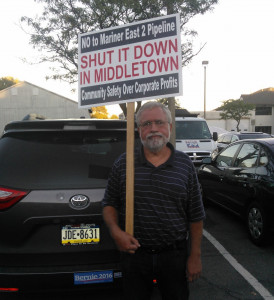
Jon Hurdle / StateImpact PA
Mitch Trembicki, an opponent of the Mariner East 2 pipeline project, also submitted comments to DEP criticizing plans to build the pipeline.
“DEP is still reviewing the permit applications, and there is no timetable for a decision,” Shader wrote in an email. The company still needs one Chapter 105 permit on Water Obstruction and Encroachment for each of the 17 counties the line would cross, as well as three Chapter 102 permits on Erosion and Sediment Control, he said.
Shader said he wouldn’t comment on potential litigation.
Some pipeline critics say Sunoco’s application remains deficient despite the company’s efforts to meet DEP’s demands.
Eve Miari, a spokeswoman for the Middletown Coalition for Community Safety, a leading opponent of the line in the western suburbs of Philadelphia, said Sunoco’s application – which she has viewed online – contains deficiencies including private wells and wetlands that she said are missing from the application.
“The public remains concerned that granting permits before deficiencies are corrected could have a detrimental impact on private and public drinking water,” Miari said.
Critics of the line in Middletown and nearby municipalities have argued that it would expose the public, including school children, to the risk of explosion or asphyxiation if the line leaked or ruptured in their communities.
John McBlain, a member of Delaware County Council, acknowledged the safety concerns but said they are being addressed by state and local governments.
“Safety is the first duty that any government owes to its residents,” he said. “From a government standpoint, we think those concerns are being addressed, and we want to make sure that if this product is brought through our county it is as safe as it can be and that our residents can be assured of that.”
















